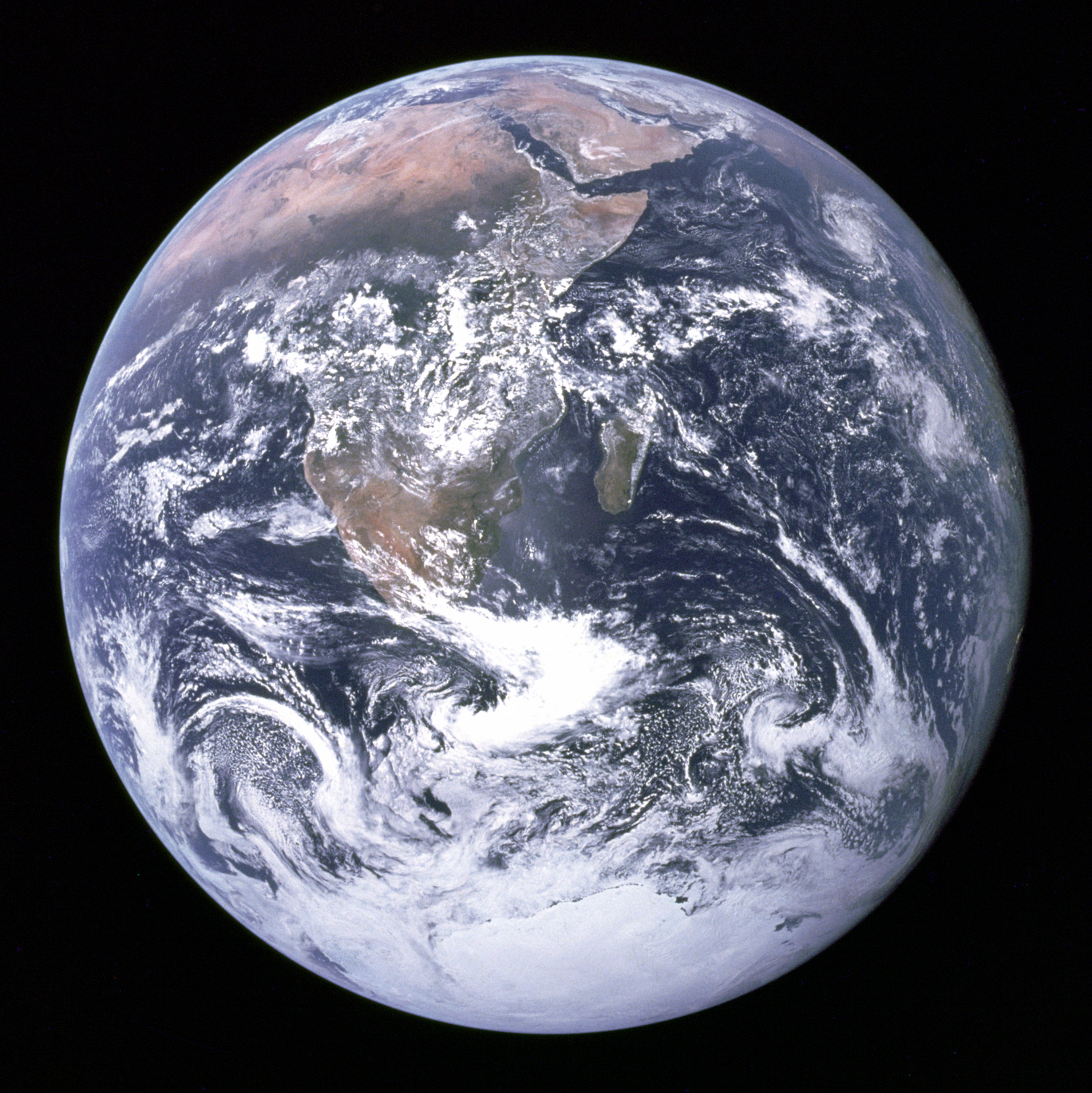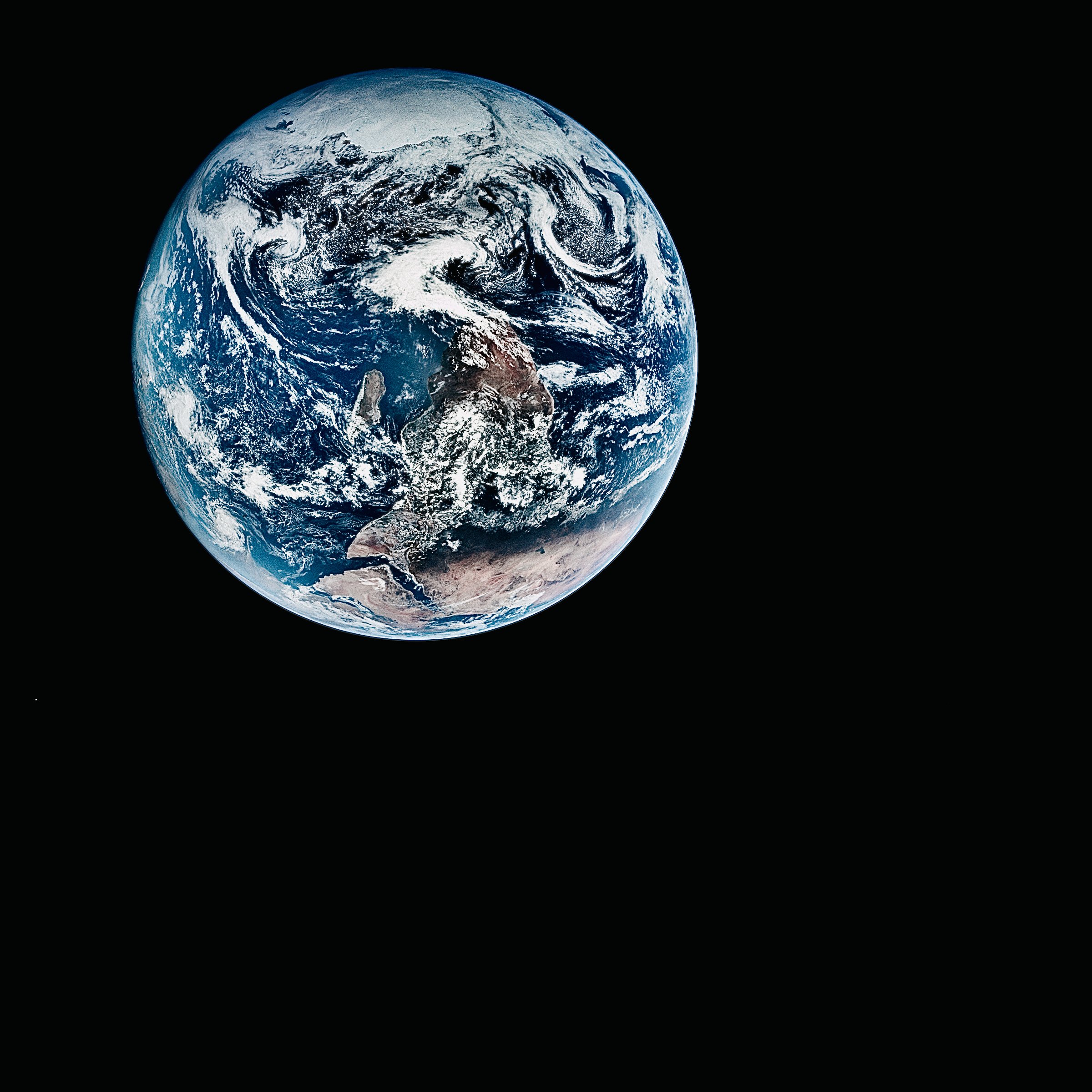-
Genesis & the Blue Marble
(2020)
Just before graduating Northwestern, I guest preached this sermon to my church. Since it was Spring 2020 and we were in the early stages of COVID-19 lockdown, I gave it over Zoom from the bedroom of my college apartment.

"The Blue Marble" (Crew of the Apollo 17, 1972)
There’s few texts in the old testament quite as iconic as Genesis 1. It’s the epic opening of the story, where God creates the world, and from that, everything else unfolds. At the same time, the text is also the source of much controversy, especially between Christians and the scientific community. But there’s one verse in particular, verse 28, that’s always rubbed me personally the wrong way. “And God blessed them, and God said unto them, Be fruitful, and multiply, and replenish the earth, and subdue it: and have dominion over the fish of the sea, and over the fowl of the air, and over every living thing that moveth upon the earth.” I’ve heard this verse used in all sorts of contexts. Everything from criticizing vegetarians to supporting unchecked deforestation. Many of these arguments fall flat when examined alongside the rest of the bible, but they stem from those two words: “subdue” and “dominion.” In my mind it inspires a disturbing image of this chain of command with God at the top, then humanity, then the rest of creation.
And I think why it bothers me so much is that I’ve just never seen or experienced the world that way. From a very early age, it made sense to me that we were here alongside the rest of creation. Sure, we build skyscrapers and submarines and spaceships, but at the end of the day, as a species are just as tied down to this earth as any other creature. Not to mention, after every part of the story leading up to this point, we hear that God saw creation and that “it was good.” Surely, God wouldn’t create such a beautiful world and then condone its destruction. The verse never made sense to me, and so I chose to ignore it. Until now. Looking at the texts for my senior sermon stood my two of my old enemies, “subdue” and “dominion.” So I chose to dig deeper. What might be there, that I couldn’t see, and what was blocking my vision?
You may have noticed my Zoom background (title image). It’s a very famous picture called “The Blue Marble.” I recently read in an essay that it’s one of the most widely distributed photographs in human history and likely the most commonly known image of Earth. It was taken by the crew of Apollo 17 in 1972. The essay goes so far as to say the emergence of Earth photographs like this split humanity’s timeline into two distinct segments, one in which we could only guess what our home planet looked like, and one in which we’d seen everything. Every person, everything we’d ever made, the entire history of humankind contained in a photograph. This offers a unique perspective, because to see the world from space is to see it without the lens of opinions or different points of view that can be so blinding down on the surface. It is, in fact, it’s own, separate point of view, seemingly as removed from us as it could possibly be. But something isn’t quite right about this picture. You see, that wasn’t the original image. This was.

"The Blue Marble" as it was originally taken
When you look at the world in this orientation, it doesn’t look quite right, does it? You may not notice Africa and the Arabian peninsula right away, because they’re South-side up. They don’t look the way we’re used to seeing them. We took one of the most objective pictures we’d ever produced and reframed it to make sense within our own worldview.
That brought me back to Genesis 1 and got me thinking about how we may have reframed its image of Earth as well. You see, the chain of command mentality fits all too neatly into this country’s current system of capitalism. It stages God as this all powerful CEO who started the company and established the pecking order. Who gives us leave to exploit not only natural resources, but also each other, all because we see the world through the lenses of “subdue” and “dominion”. But that just doesn’t seem to be the message we’re meant to get. It seems especially wrong in the context of senior recognition Sunday, where I and the other students are to be sent out into the world. So let’s see what else we can find in the text.
In that same verse, verse 28, we are told to “be fruitful, multiply, and replenish the earth.” Often this part is ignored, or simply interpreted as encouragement to have many children. But there’s more to it than that. We could interpret fruit to mean many things, but whatever it may be, the act of bearing it is selfless. We are given what we need by the Earth, but at the same time, we are told we must bear fruit as well, and replenish what we have taken. It’s a reciprocal relationship and it goes directly against our modern understanding of capitalism and structures of command. This isn’t the kind of “dominion” we’re used to. But maybe, that’s because we had it upside down the whole time.
To see this a bit more clearly, it may help to look at the Gospel reading. It’s called the Great Commission, and in it, Jesus claims authority over all humanity, and sends out his disciples to spread what they’ve been taught, to heal and feed, to touch the untouchables, and challenge the exploitative institutions of their day. They were tasked to see the world through love, not dominion. And Jesus, in turn, grants them this same love saying, “surely I am with you always, to the very end of the age.” This isn’t God the CEO, but a compassionate God in communion with people. Further, it’s a call to stewardship, or caring for something you do not own. The disciples are not told they are above anyone, and the authority they have to teach comes through them from God, not from any rank or experience of their own.
I think the message we take away from these texts ultimately comes down to what lens we choose to look at them through. In this country, which is dominated by the Christian religion, those of us who believe have somehow been taught to value capitalism and selfishness more than the bible. We contort scripture to be compatible with that understanding, just like we take the earth and turn it upside down, because that’s the way we make sense of it. But what if we took up a different lens, perhaps love, or community. If I could, I’d like you to picture the image of trinity, which is God in communion with God. This unity can be seen as a symbolic representation of our own relationships with other people. If our god is a god of separate entities, none greater than the other, but bound together, how could we model that in out own lives? How might we read the bible differently? Most importantly, how might we see our world differently? I can’t help but think of the current protests following the death of George Floyd and more generally the police brutality experienced by people of color in our country. I think a more compassionate lens might change the way we perceive and address that situation.
Today, among many other things, is senior recognition Sunday, a day where the graduating members of this congregation, including myself, will reaffirm our baptism and be sent out into the world. So instead of drawing the obvious similarities between that and the sending out of the disciples (a good sermon for normal times, yet these aren't normal times), I’d like this sermon to do something different. I would like this sermon to serve as a warning, for those of us departing as well as those of us staying. A warning that what we see isn’t always what’s there. It matters what lens you see it through.
So I challenge you to see the world through a lens of oneness. In times like these, it can be difficult. Not only are we physically separated from one another, but also divided as a country. It is no easy task to think about other people’s needs in a time when we’re afraid for our own. But there’s also no time when it’s more important.
